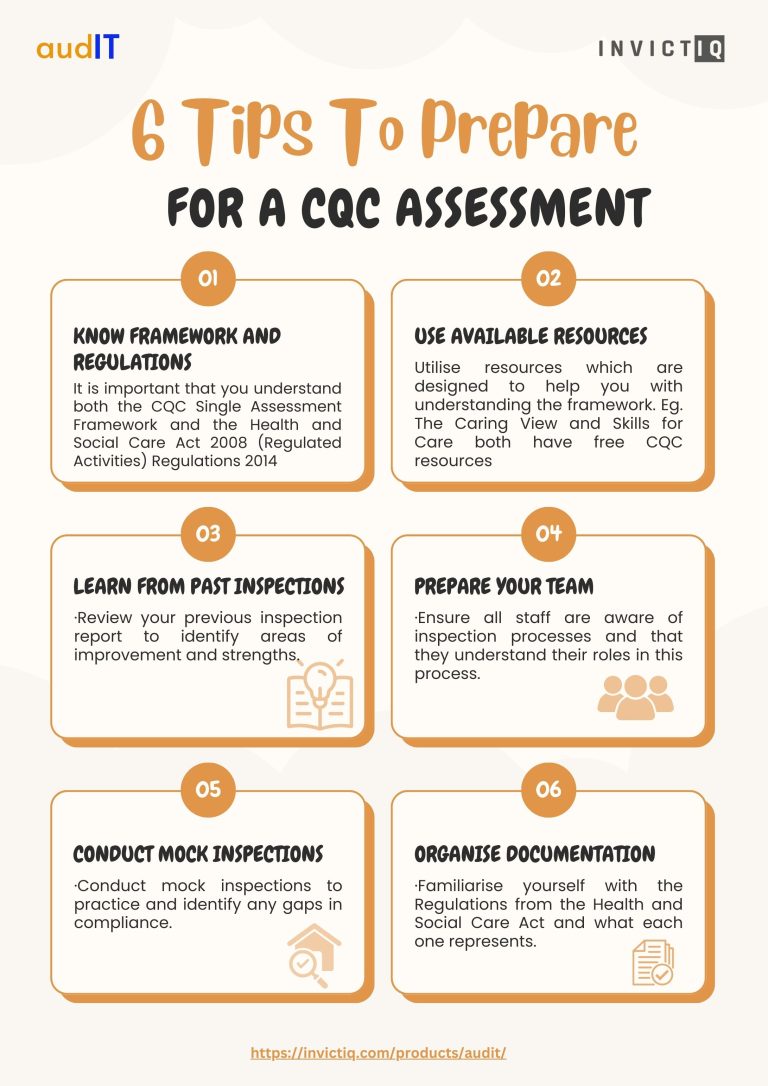@2021 invictIQ is a venture by Sprint Consultancy. All rights reserved. Privacy Policy.

What to Do When the Inspector Calls
by Mark Topps
As a Registered Manager, the prospect of a CQC (Care Quality Commission) inspection can be daunting and I remember all too well, the anxiety on the day of the inspector turning up. However, with the right preparation and mindset, you can navigate this process smoothly and confidently and this article aims to provide practical advice to help with the anxiety, tips to prepare and steps to take post inspection.
A. Preparation is key, and in order to prepare yourself and your team it is important that you understand both the CQC Single Assessment Framework and the Health and Social Care Act 2008 (Regulated Activities) Regulations 2014. Here are some tips:
- Break down the Single Assessment Framework into bitesize chunks, for example:
- Safe – Ensure people are protected from abuse and avoidable harm.
- Effective – Providing care, treatment and support that achieves good outcomes, helps maintain quality of life, and is based on the best available evidence.
- Caring – Staff involve and treat people with compassion, kindness, dignity and respect.
- Responsive – Services are organised so that they meet people’s needs.
- Well-led – Leadership, management and governance ensure the delivery of high-quality, person-centered care and promote an open and fair culture.
- Utilise resources which are designed to help you with understanding the framework, for example organisations such as The Caring View and Skills for Care both have free CQC resources for you and your team.
- Review your previous inspection report to identify areas of improvement and strengths.
- Familiarise yourself with the Regulations from the Health and Social Care Act and what each one represents.
- Conduct mock inspections to practice and identify any gaps in compliance.
- Ensure all staff are aware of inspection processes and that they understand their roles in this process.
- Ensure your documentation is organised and up to date. I would create a checklist of any documentation that needs to be checked so nothing is overlooked. Remember to involve your team so that they are involved and that you are not overwhelmed.
This list is not exhaustive, and I would encourage you to do your research into what you can do to prepare. I would recommend that you put all your ideas into a continuous improvement plan/action plan template so you can evidence to the inspector/CQC of your future planning.
Digital solutions such as Audit On Cloud by InvictIQ can support with electronic auditing and feedback management. Their AI powered Action Planning not only automates the process but also identifies gaps and areas of improvement in the specific Key Question or Quality Statements. The Survey/Feedback module within the platform enables users to conduct surveys seamlessly while leveraging AI-powered sentiment analysis. Additionally, automated reviews and key insights accompany each survey, enhancing the overall feedback management process.
B. Inspections will either be announced or unannounced and you should ensure you have plans in place with your team of what happens during each of these. Here are my top ten tips (infographic available for download):
- Remind your team that an inspector is a human, just like them, and just doing their job. This reminder can help remove the fear that many of our care workforce have towards the regulator.
- Ensure your team are aware that they need to check the inspector’s identity. It is in their right to refuse entry if they cannot be sure that someone is actually from the CQC. Remember, your service needs to evidence it is keeping people safe, and checking ID is one way to evidence this.
- You and your team need to ensure they are calm and professional throughout the inspection, remembering not to take opinions of the inspector personally. Remain positive and optimistic throughout.
- Remain transparent and answer any questions honestly and provide clear, concise information. Remember, if you or one of your team do not know an answer, it is okay to say this and to offer to find out.
- Admit to any known issues and have a plan to fix them ready, this is where your action plan / continuous improvement plan comes into place.
- Remember your team throughout the inspection as their emotions may be running high. Remember to support and address any issues/questions they have.
- Ensure your team are demonstrating excellent care, including adherence to infection control measures, privacy and dignity is maintained etc.
- Highlight areas where your service excels and provide examples of positive outcomes and improvements made since the last inspection.
- Remember to check consent from your staff and those who you support, that they are happy for their information and data to be shared.
- At the end of the inspection your inspector will meet with you to summarise their initial findings. Make sure that you are productive as this is not a meeting for you to sit and nod and agree to what they are saying if you do not agree. Ensure you utilise this meeting to provide counterviews where needed.
C. Post Inspection is a chance for you to reflect on the inspection, how you felt it went, what you could do better, and to digest the feedback provided by the inspector. Ensure you meet with your team to ensure you can share the inspection feedback with them and celebrate any positive feedback and work through areas of shortcomings. You can utilise these shortcomings and update your action plan. It may be that your inspector may have made recommendations, and I would recommend that you take prompt action, monitor progress and ensure that improvements are sustained.
Now you have had your inspection, you have time to prepare for your next one. Here are some areas to focus on:
- Training and development of your staff team to ensure they have the skills to meet the needs of those they are supporting.
- Utilise technology and data to make informed decisions.
- Ensure you undertake regular audits and action identified shortcomings
- Maintain open lines of communication with your team.
- Regularly seek feedback from the people you support, their families/representatives and your staff team and act on this feedback.
- Regularly review and update your practices to maintain high standards of care.
- Take time to celebrate your teams successes
- Embed the Single Assessment Framework
- Stay up to date with CQC changes
- Embed the Health and Social Care regulations and ensure your team are aware of these too
I hope this guide helps you prepare for your next inspection and allows you to approach your next CQC inspections with confidence.
MORE ARTICLES

Mark Topps is a social care leader who has worked in the care industry since 2004 and is currently working as a regional support manager. He regularly advocates, appearing on television, radio and podcasts and has started many campaigns for change in legislation and culture within the industry. Mark is the co-founder of The Caring View which is a social care podcast, YouTube show and free resource initiative for the sector. He also co-founded The Health and Social Care Club, which is an audio event hosted on LinkedIn. Mark is also the social media and marketing director at the National Association of Care and Support Workers.
Share
Sign up for our newsletter

